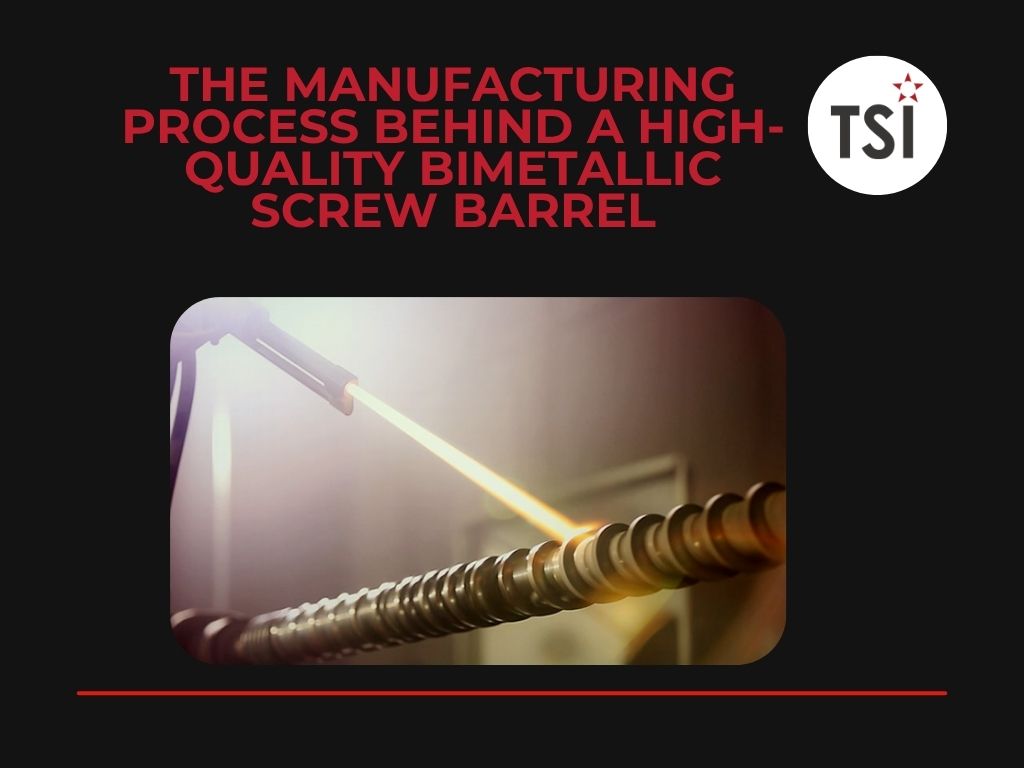The Manufacturing Process Behind a High-Quality Bimetallic Screw Barrel
Producing a high-quality bimetallic screw barrel requires much more than standard machining — it demands precision metallurgy, material science, and years of engineering experience. The performance of an injection molding or extrusion system depends heavily on this critical component, which must endure extreme pressure, temperature, and wear while maintaining tight dimensional tolerances.
Driven by a pursuit of precision and reliability, Tan Star Industries (TSI) has spent years perfecting the manufacturing process behind every bimetallic screw barrel. Each production stage — from selecting raw materials to conducting final inspections — reflects our commitment to long-lasting performance, dimensional accuracy, and global quality excellence.
1. Selecting the Right Base Material
Every high-performance bimetallic screw barrel starts with a carefully chosen base metal. TSI uses high-strength alloy steels that provide excellent toughness and thermal stability. These materials form the structural backbone of the barrel, supporting the internal alloy layer that resists corrosion and wear.
The base metal is first cut and rough-machined to the desired shape, ensuring that the outer geometry and wall thickness will support the subsequent centrifugal casting process. This preparation is crucial to achieving strong bonding between the two metal layers.
2. Bimetallic Centrifugal Casting — The Core Process
The heart of TSI’s manufacturing excellence lies in bimetallic centrifugal casting. In this process, molten alloy — typically a nickel-based or tungsten-based composite — is poured into a preheated, rotating barrel shell. The high-speed rotation generates a strong centrifugal force that evenly distributes the alloy along the inner wall.
This ensures a dense, defect-free alloy layer that firmly bonds to the base material. By precisely controlling temperature, rotational speed, and cooling rate, TSI achieves a uniform thickness and strong metallurgical adhesion between the alloy and substrate.
Compared with traditional coating or welding methods, centrifugal casting delivers a significantly more reliable and durable composite structure, capable of withstanding severe abrasion and chemical attack during production.
3. Precision Heat Treatment for Strength and Stability
After casting, the barrel undergoes controlled heat-treatment procedures to enhance the hardness and bonding strength between the alloy layer and the base material.
Through precise temperature management and process control, the finished barrel achieves uniform hardness and structural stability — ensuring long-term durability even under high operating temperatures.
4. CNC Machining and Finishing
TSI utilizes advanced multi-axis CNC machining centers, including DMG MORI 5-axis machines, to complete precision processing in a single clamping operation.
This ensures high machining accuracy, excellent alignment, and consistent quality throughout the barrel’s internal surface.
By combining CNC turning, fine finishing, and precision grinding, TSI achieves stable dimensions that enhance plasticizing efficiency and extend the service life of the barrel.
At this stage, additional features such as feed zones, vent ports, or customized fittings can be added based on customer specifications.
5. Quality Inspection and Performance Verification
Before delivery, every bimetallic screw barrel produced by TSI undergoes a comprehensive inspection process. Dimensional checks, hardness testing, ultrasonic flaw detection, and adhesion tests are performed to ensure the alloy layer’s consistency and integrity.
Each product is evaluated for its wear and corrosion resistance according to the customer’s application — whether it involves glass-filled resins, flame-retardant materials, or corrosive compounds. Only barrels that pass every inspection step are approved for shipment.
6. Continuous Innovation and Customization
Beyond production, TSI continuously invests in R&D and process improvement. Our engineers collaborate with customers to design custom screw and barrel configurations optimized for different materials and processing conditions.
With manufacturing capabilities that include barrels up to 270 mm in diameter and 7,500 mm in length, TSI serves industries such as household appliances, industrial machinery, medical equipment, and optical components. This flexibility ensures that each product not only meets but exceeds the demands of modern plastic manufacturing.
Conclusion — Precision Built to Last
A bimetallic screw barrel is more than just a machine part — it’s the foundation of a reliable and efficient production system. The meticulous processes of casting, heat treatment, machining, and inspection all contribute to its superior performance and lifespan.
At Tan Star Industries (TSI), we combine advanced technology with decades of craftsmanship to produce barrels and screws that stand the test of time. Our commitment to precision and innovation ensures every product delivers consistent quality and maximum productivity.
Looking to upgrade your production equipment?
Contact Tan Star Industries today to learn more about our custom-engineered bimetallic screw barrels and discover how our expertise can elevate your plastic-processing performance.

